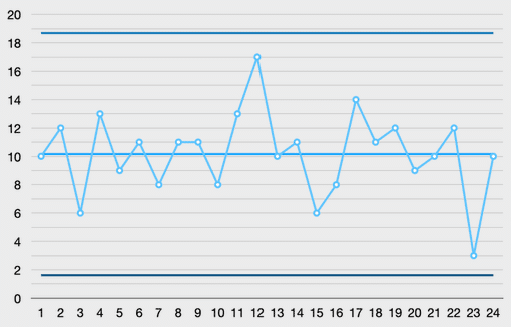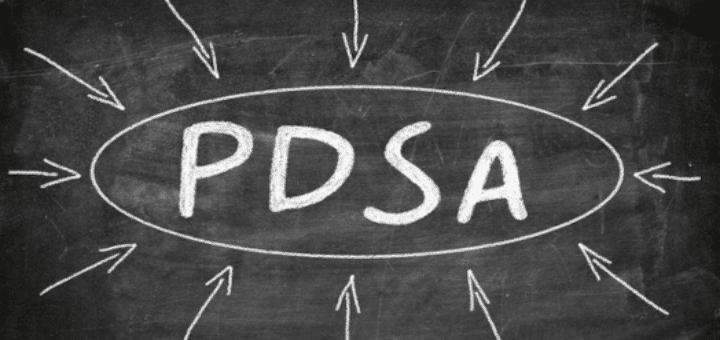THE DEMING INSTITUTE BLOG
| Psychology, respect for people
Prioritizing Joy in Work
Guest post by John Hunter, founder of CuriousCat.com. Many lessons have been learned during the last year as the pandemic caused havoc with our lives and economy. During this time, we found new ways of operating our business that would have likely been deemed impossible before. As we return to more normal lives, as vaccines […]
| data
The First Control Chart
Guest post by John Hunter, author of the Curious Cat Management Improvement Blog (since 2004). Dr. Walter Shewhart developed the control chart in the 1920s while working for Bell Telephone. The text of the memo that including the image of the control chart: A few days ago, you mentioned some of the problems connected with […]
| Healthcare, Understanding Variation, Understanding Variation | 2 Comments
Learning with the Science of Improvement during COVID-19 with Rocco Perla and Lloyd Provost
Guest post by John Hunter, author of Management Matters: Building Enterprise Capability. This embedded video is a webcast with Rocco Perla and Lloyd Provost: Learning with the Science of Improvement during the COVID-19 Pandemic. The presentation is from April 2020 which is useful to keep in mind given the rapidly changing COVID-19 situation. Their explanations […]
| systems thinking
How People are Using Deming’s Management Ideas to Respond to COVID-19 Conditions
Guest post by John Hunter, founder of CuriousCat.com. Deming’s management ideas are not prescriptive. The principles are useful to organize your thinking and adapt concepts to your situation. That provides a great deal of flexibility to changing conditions. And those principles result in creating a management system that is robust in the face of changing […]
| Deming on Management | 2 Comments
Deming on Management: Getting Started
Guest post by John Hunter, author of the Curious Cat Management Improvement Blog (since 2004). One of the challenges adopting Deming’s management ideas is that it doesn’t provide a simple process to follow. There is no recipe – no first do x, then do y, then do z. Instead the ideas must be learned and […]
| Understanding Variation
How Can Deming’s Management Ideas Help During the COVID-19 Pandemic?
Guest post by John Hunter, author of Management Matters: Building Enterprise Capability. When using Dr. Deming’s management ideas in your organization, the principles must be considered and applied to your organization. Those principles help create an organization that is adaptable – continually responding to changes in the outside world, continually experimenting and improving with an […]
| Deming Today, Education | 4 Comments
The Power of PDSA in Education
Guest Post by Amy Ripperger, Instructional Coach, Indianola CSD, Educational Leadership Graduate Student, Drake University. If we want our students to reach their fullest potential, then we, the educators, must work to reach ours. But we have to be careful here, for at the heart of continual improvement lies an acceptance that we won’t ever “arrive.” We must be okay with this. Perfection isn’t the goal, continual improvement is.
| Deming Philosophy, systems thinking
Addressing Dysfunctional Company Culture
Guest post by John Hunter, founder of CuriousCat.com. When a company’s culture rots, eventually everyone pays: customers, employees, stockholders, and suppliers. Yet, when the focus is on the short term, the long-term consequences are easy to ignore, even though everyone eventually suffers. Once those consequences are realized, there is interest in addressing the consequences of […]
| Dr. Deming | 2 Comments
Musical Compositions by W. Edwards Deming
Guest post by John Hunter, founder of CuriousCat.com. Dr. Deming encouraged organizations to respect the whole person; he recommended encouraging education even if it was not directly related to the employee’s job or potential jobs with the organization. In his own life, he pursued interests beyond those he is well known for, one of those […]
| process thinking | 6 Comments
The “Small Jumps” of Change
Guest post by Doug Stilwell, Drake University. There are indeed many reasons change efforts fail. But we can avoid one of those reasons by taking “small jumps;” breaking down important change/improvement efforts into manageable and measurable steps so that the daunting size and complexity of initiatives are not the cause of failure.












